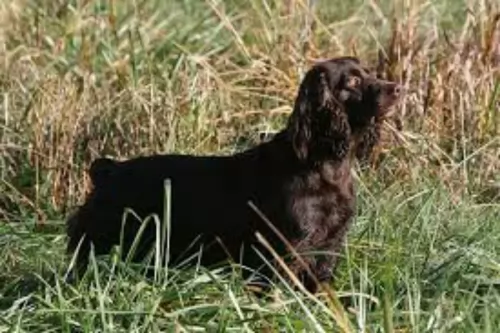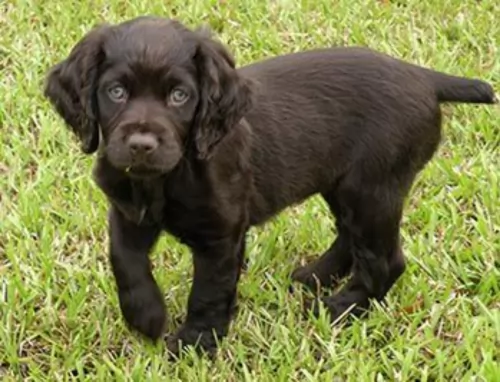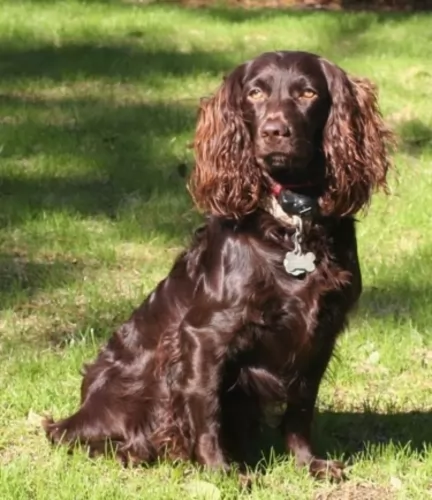 Petzlover
Petzlover Boykin Spaniel is originated from United States but English Setter is originated from United Kingdom. Boykin Spaniel may grow 23 cm / 9 inches shorter than English Setter. Boykin Spaniel may weigh 62 kg / 136 pounds lesser than English Setter. Both Boykin Spaniel and English Setter has almost same life span. Both Boykin Spaniel and English Setter has almost same litter size. Both Boykin Spaniel and English Setter requires Moderate Maintenance.
Boykin Spaniel is originated from United States but English Setter is originated from United Kingdom. Boykin Spaniel may grow 23 cm / 9 inches shorter than English Setter. Boykin Spaniel may weigh 62 kg / 136 pounds lesser than English Setter. Both Boykin Spaniel and English Setter has almost same life span. Both Boykin Spaniel and English Setter has almost same litter size. Both Boykin Spaniel and English Setter requires Moderate Maintenance.
 The Boykin Spaniel was originally bred by South Carolina hunters as the perfect dog for hunting wild bird during the early 1900s. Alexander White of Spartanburg found a short, well built dog and named him Dumpy. The dog was given to a certain L. Whitaker Boykin and a similar dog in looks was found and mated with Dumpy on Boykin’s Pine Grove plantation. Whitaker Boykin was particularly looking for a special kind of hunting dog breed that could wade into swamplands and into water.
The Boykin Spaniel was originally bred by South Carolina hunters as the perfect dog for hunting wild bird during the early 1900s. Alexander White of Spartanburg found a short, well built dog and named him Dumpy. The dog was given to a certain L. Whitaker Boykin and a similar dog in looks was found and mated with Dumpy on Boykin’s Pine Grove plantation. Whitaker Boykin was particularly looking for a special kind of hunting dog breed that could wade into swamplands and into water.
Boykin’s spaniels were popular in South Carolina before World War II and later, in 1977, the Boykin Spaniel Society was founded to ensure the breeding standards of the dog. In 1985, the Boykin Spaniel was declared the state dog of South Carolina and recognized by the American Kennel Club in 2009.
 The English Setter seems to have been a hunting dog in England as far back as the 15th century. These dogs were known to be ‘setter types’ – hunting dogs that ‘set dogges’ – to set or point at game birds. It is believed that the English Setter is a cross of the Water Spaniel, Spanish Pointer and English Springer Spaniel. In the late 1500’s Sr. Johannes Caius, a sportsman, announced to his friends that there was a new dog our of France for hunting. He then describes an English Setter.
The English Setter seems to have been a hunting dog in England as far back as the 15th century. These dogs were known to be ‘setter types’ – hunting dogs that ‘set dogges’ – to set or point at game birds. It is believed that the English Setter is a cross of the Water Spaniel, Spanish Pointer and English Springer Spaniel. In the late 1500’s Sr. Johannes Caius, a sportsman, announced to his friends that there was a new dog our of France for hunting. He then describes an English Setter.
Then in the early 1800’s Rev. Harrison of Carlise sold a couple of setters to Mr. Laverack. This pair is the foundation for the breed of English Setters. Without really knowing, Laverack claimed that this line he was breeding from had been pure for 35 previous years. He inbred his male and female for many years and did well in confirmation and field trials.
Then in 1874 the first English Setters were imported to the US from this Laverack line. Mr. Llewellin then crossed the best dogs in the Laverack line with his dogs and eventually produced winning champions Armstrong Dash II and Dashing Bondhu. This led to the “Dashing Bondhu” or the Llewellin line of English Setters. This is why the English Setter is sometimes referred to as the Llewelllin or Laverack Setter.
The setter group to which the English setter belongs includes the Irish Setter, the Gordon Setters and the Irish Red and White Setter. The English Setter, as well as the others, were bred to hunt birds such as pheasant and quail. It was the job of the setter to find the prey and point it out to the hunter after it had been shot. They were also used to flush the birds from the brush so that the hunter could then release hawks to take down the prey. The English Setter is methodical and systemic in their approach.
By the 1600’s this working dog had become the breed of the landed gentry and shooting game was their pastime. These nobles did not use hawks to capture the prey but rather shot them after the English Setter flushed them out. The English Setter is very popular today both as a hunting dog and as a family pet. The English Setter is bred for athleticism and endurance. The have both AKC and UKC certification.
 You can’t miss the medium-sized Boykin Spaniel with his magnificent coat in different shades of brown. When he gleams in the sun he looks like chocolate. This type of Spaniel is a bit bigger than the English Cocker Spaniel, but he is heavier, weighing between 13 to 18kg. He has large, floppy feathery ears and the tail has always been docked to give him that distinct look, but now with rules and regulations, the tail is often left so that it is long and feathery. The height of this dog at the withers is 39 to 43cm.
You can’t miss the medium-sized Boykin Spaniel with his magnificent coat in different shades of brown. When he gleams in the sun he looks like chocolate. This type of Spaniel is a bit bigger than the English Cocker Spaniel, but he is heavier, weighing between 13 to 18kg. He has large, floppy feathery ears and the tail has always been docked to give him that distinct look, but now with rules and regulations, the tail is often left so that it is long and feathery. The height of this dog at the withers is 39 to 43cm.
The length of the dog’s coat varies somewhat because of the different breeds from the past. Essentially the coat is medium length and wavy to curly with light feathering around the legs, ears, chest and stomach.
The Boykin Spaniel is social and he makes an excellent family pet. He is good around children and other dogs, and with training and socialization he becomes even more amicable and obedient.
 The English Setter is very much a setter in his looks. He is medium in size and was bred to hunt by following airborne prey over a large expanse of ground. He has to have both speed and stamina. He also has to run with his head up watching the prey in the air.
The English Setter is very much a setter in his looks. He is medium in size and was bred to hunt by following airborne prey over a large expanse of ground. He has to have both speed and stamina. He also has to run with his head up watching the prey in the air.
He has a slight dome shaped head and a long muzzle with dark, gentle eyes. The ears have their tips lined up with the eyes, the neck is long and muscular. He shows powerful hindquarters and a fairly long tail.
The coat length is medium and silk. The ears, chest, neck and legs are feathered, as is the tail. The hunting version has a shorter, finer coat than the show dog. The show dogs’ coats are flowing and long. Both types have a white coat with Belton or ticking. The Belton can be black, orange, lemon, liver and the tricolor. This is the liver or blue Belton but there are tan markings on the legs, chest, and face. It was Laverack who named the ticking Belton after a village in England.
 The Boykin Spaniel is a diverse breed. The characteristics of the dog aren’t set in stone. He is a hunting dogs with boundless energy and enthusiasm. He is an intelligent breed and responds well to training and is obedient to your commands. He is all about fun and excitement and he is guaranteed to make a splendid companion.
The Boykin Spaniel is a diverse breed. The characteristics of the dog aren’t set in stone. He is a hunting dogs with boundless energy and enthusiasm. He is an intelligent breed and responds well to training and is obedient to your commands. He is all about fun and excitement and he is guaranteed to make a splendid companion.
Active and social, he is going to need input from his owners in terms of exercise and mental stimulation. He isn’t a dog to just ignore and in exchange for love and care, he is going to be a loving, loyal and fun companion for you.
 The AKC standard for the English Setter breed describes him as a “Gentleman by Nature” and that might be all you need to know about this delightful dog. They are people-oriented and settle right down with their families if they get enough exercise. With proper stimulation they become couch potatoes when you bring them in at night.
The AKC standard for the English Setter breed describes him as a “Gentleman by Nature” and that might be all you need to know about this delightful dog. They are people-oriented and settle right down with their families if they get enough exercise. With proper stimulation they become couch potatoes when you bring them in at night.
They are very friendly with everyone but are especially happy when playing with children. You can trust them with your other pets, children of all ages and anyone coming to your front door. They are not guard dogs. However, they can have a stubborn streak, they can be strong-willed. This is especially true the more working than show stock they are. In addition, they are intelligent, calm and quiet in the house.
 The Boykin Spaniel is a healthy breed with a life span of 14 to 16 years. There are some diseases that you want to be aware of with your Boykin Spaniel.
The Boykin Spaniel is a healthy breed with a life span of 14 to 16 years. There are some diseases that you want to be aware of with your Boykin Spaniel.
Always be aware of Hip Dysplasia as it can reduce your pet’s quality of life.. In dogs with hip dysplasia, the hip joint doesn’t to develop properly and deterioration sets in and your pet can lose function of the joint. You’ll notice your pet battling to stand up after lying down. The frightening this is that some dogs begin to show signs of hip dysplasia as early as 4 months of age.
The Boykin Spaniel’s most common health problems apart from hip dysplasia are patellar luxation and juvenile cataracts.
 English Setters, like many other breeds that have a base white coat, can be affected by congenital deafness. A test done by LSU in 2010 showed the 12.4% of the dogs they tested were affected by this. They are also prone to:
English Setters, like many other breeds that have a base white coat, can be affected by congenital deafness. A test done by LSU in 2010 showed the 12.4% of the dogs they tested were affected by this. They are also prone to:
Most of this is caused by autoimmune thyroiditis or a condition where the immune system attacks its own thyroid gland.
The primary cause of death after ten years old
 The Boykin Spaniel has been a gun dog and because he is energetic, he will need plenty of exercise and activities. Take him for walks or allow him to swim in the farm dam if you live in the country. He isn’t a dog to leave on his own in your backyard as he needs exercise as well as mental stimulation to keep him from becoming frustrated and developing destructive habits.
The Boykin Spaniel has been a gun dog and because he is energetic, he will need plenty of exercise and activities. Take him for walks or allow him to swim in the farm dam if you live in the country. He isn’t a dog to leave on his own in your backyard as he needs exercise as well as mental stimulation to keep him from becoming frustrated and developing destructive habits.
The Boykin’s hair will need to be brushed as least twice a week to prevent it from matting, particularly if he is a country-living dog, in and out of water and running through long grass. He is not a heavy shedder but his shedding is seasonal. As a long eared dog, he will need to have his ears checked to prevent infection.
Other grooming habits to get used to with your Boykin Spaniel are having his nails trimmed and brushing his teeth at least 2 or 3 times a week with special dog toothpaste and brush.
Boykin Spaniel owners who know the breed well say that there is nothing better than feeding your dog raw meat with vegetables and rice. Of course, not everyone can afford to feed their pets raw meat every day, and that’s alright. Just make sure that every now and then you include raw meat into your pet’s diet.
The very best commercially produced dog foods can also be good for your pet. If in doubt, speak to your veterinarian about the best food for your active, energetic pet. Never, ever deprive your pet of fresh, cool water throughout the day and night.
 The English Setter is a hard working dog and should be fed accordingly. Puppies should be fed three times a day and adults twice to avoid bloat. Watch your English Spaniel though as they love to counter surf.
The English Setter is a hard working dog and should be fed accordingly. Puppies should be fed three times a day and adults twice to avoid bloat. Watch your English Spaniel though as they love to counter surf.
In addition to the conditions listed above the English Setter is prone to:
Caused by excessive exercise before or after having eaten a large meal. It is suggested that you feed your English Setter twice a day, smaller meals and not right before or after strenuous exercise.
Keep her ears clean and check regularly for infections.
The English Spaniel needs exercise on a routine basis – every day walks are best along with some time to just run either in a fenced yard or dog park. Take her jogging, running alongside your bike, hiking or just long walks. They do well with lure coursing, agility, confirmation, obedience and rally.